National Theatre: Why Nicholas Hytner is a hard act to follow
- Published
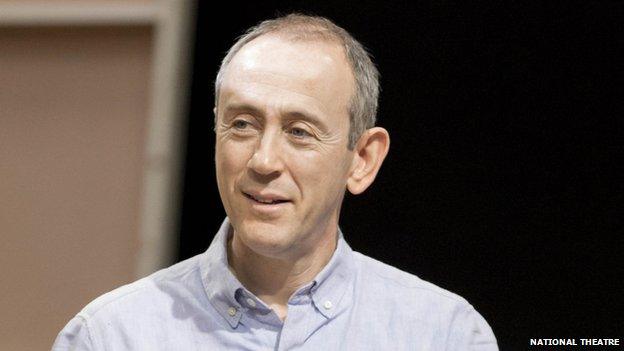
Sir Nicholas Hytner took over from Sir Trevor Nunn as the director of the National Theatre in April 2003
As the National Theatre makes preparations for its 50th anniversary celebrations this month, the search has been on to find a new artistic director who will replace Sir Nicholas Hytner.
Sir Nicholas, who has been in the job 10 years, announced in April that he would be stepping down at the end of March 2015.
An announcement about his replacement is expected "in the autumn".
Nick Starr, the theatre's executive director since 2002, also announced he would be leaving the NT during 2014.
There has been no shortage of speculation as to who might take on the biggest job in British theatre.
Among the most well-known names who have been mentioned are ex-Donmar Warehouse bosses Sam Mendes and Michael Grandage, and theatre and film directors Stephen Daldry and Danny Boyle and Sir Kenneth Branagh.
Others include former Royal Court artistic directors Ian Rickson and Dominic Cooke, and Chichester Festival Theatre's Jonathan Church.
Could the job go to a woman for the first time? War Horse director Marianne Elliott, Thea Sharrock, former artistic director at London's Southwark Playhouse and Gate Theatre, and new Donmar boss Josie Rourke, among others, have been mentioned as potential candidates.
But several have already ruled themselves out of the race.
Sam Mendes, whose Charlie and the Chocolate Factory musical opened in the West End this summer, admitted that while he was "interested", he had not applied.
"How can you not be interested? It's the most amazing job," he told The Stage, external in June. "But it's a simple thing for me, and if I run the National Theatre I can't direct movies. It's no more complicated that that - I love directing movies as well as plays."
It was later announced that Mendes would be directing his second James Bond film after the success of 2012's Skyfall. Mendes also returns to the National Theatre this autumn to direct Simon Russell Beale in King Lear.
Meanwhile, Michael Grandage - who took over from Mendes at the Donmar, leaving in 2011 to form his own company - confirmed that he would be "uneasy" with the public side of the role and wanted to stick with directing.
"I didn't apply," he told Mark Lawson in the Guardian, external. "A member of the board contacted me and said they had seen lots of pieces in the papers saying that I wasn't interested and was that right? I said it was right."
So what are the challenges ahead for whoever takes over the top job? BBC News has been asking key players in the theatre world what they think.
Sir Richard Eyre
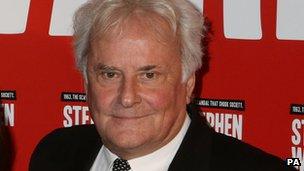
Sir Richard Eyre took over from Sir Peter Hall at the National in 1988
The National's next artistic director will have to "redefine" the role of the theatre and should not try to mimic Nicholas Hytner's success, according to Richard Eyre, who ran the National Theatre from 1988-1997.
"It's always difficult to follow a great success in any sphere whether it's in business or sport or the theatre," Sir Richard told the BBC at the recent launch of the Andrew Lloyd Webber musical Stephen Ward, which he directs.
"There's no question that Sir Nick Hytner has had a golden period as director of the National, and I don't envy the person who is stepping into his shoes but I think that anybody who takes over is going to have to redefine the work of the National Theatre.
"It wouldn't work if you you just try to mimic the successes of Nicholas Hytner," he added.
"In theatres, policy is not so much a question of ideology, it's a question of who you choose to work with - the writers, the directors, the designers and the actors - and the audience, you hope, will stay loyal."
Marianne Elliott
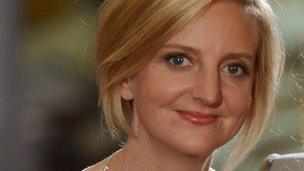
Marianne Elliott's latest show at the National is musical The Light Princess
Marianne Elliott, the Olivier-winning director of National hits War Horse and The Curious Incident of the Dog in the Night-Time, has ruled herself out of the race, saying she would find it difficult to take on the role as a mother.
"I wouldn't apply - it's not for me," she told the BBC in June, on the opening night of Sweet Bird of Youth at the Old Vic.
"It's a very particular job that requires a very particular person. I love directing and I love being in the rehearsal room and I love time at home with my child. I think for a mother to do that job is quite a big ask."
Her latest job at the National is directing the Tori Amos musical The Light Princess, which opened this week.
Rufus Norris
"I think it's got to be run in a different way and whoever takes over has got to find their own way," said Rufus Norris, who recently directed The Amen Corner at the National.
"One of the principal challenges is going to be following Nick, because he's such an extraordinary leader and director and a one-man encyclopaedia on all things to do with British theatre."
Norris said that the new person in charge would also have to develop the audience and the cultural mix and gender balance within the organisation.
He also noted the drop in public funding meant that money was having to be found elsewhere.
"I imagine that is only going to continue," he said.
"In a time of financial difficulty it is hard to argue that a theatre like this should get increase upon increase. It hasn't argued that, but it does mean that money has got to be found somewhere if the organisation is going to continue to be at the cutting edge of English-speaking arts in the world."
Jonathan Church

Jonathan Church's The Resistible Rise of Arturo Ui has just opened in the West End
"It's been the most extraordinary 10 years that Nick's had at the National, and it's gong to be a very hard act to follow," said Jonathan Church, artistic director of regional powerhouse Chichester Festival Theatre.
Church is currently overseeing a £22m redevelopment project, which has seen main house productions relocated to a giant tent in a nearby park.
"One of the things that I love here is that we we create theatre for six months, it's a hive of activity, and then we plan the next six. That rhythm's very special. The demands of the National are very different."
Would he be interested in the job? "It's going to be a very good field and wouldn't it be lovely to get the phone call and be asked to be part of that discussion, but it's a long time away and there's a theatre to finish here."
Jonathan Kent
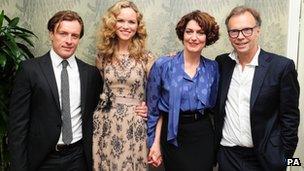
Jonathan Kent (right) directed recent West End hit Private Lives, which starred Toby Stephens, Anna-Louise Plowman, Anna Chancellor.
Theatre and opera director Jonathan Kent, who formerly ran the Almeida Theatre, would like to see somebody from a different age bracket take over at the NT.
"I think it should be someone of a different generation - somebody in their 40s," he said.
"It's quite a hard remit, but it's also a wonderful job. Whoever it is has to be the face of theatre.
"What both Nicks [Hytner and Starr] have done so brilliantly is define the role of the NT, but not just by doing endless revivals but by being extraordinarily adventurous and casting their nets incredibly wide. I think anybody who didn't follow that would be foolish."
Josie Rourke
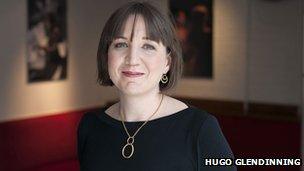
Josie Rourke took over at the Donmar after the departure of Michael Grandage
Donmar Warehouse director Josie Rourke said whoever took on the role needed an ability to understand the National's responsibility to other theatres.
"If the National Theatre is in great shape, then theatre in general tends to be in good shape," she said.
"What's been brilliant about Nick is that he's been very clear that is a role where you talk about regional theatre and the impact of local and government cuts.
"His ability to speak out with huge clarity on behalf of everything that's going on in theatre is tremendously important."
She added: "We need and deserve this healthy National at the centre of all the work that's made at theatres up and down the country.
"I think whoever gets that job can expect huge support from other theatres."
Danny Boyle
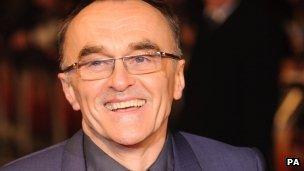
Danny Boyle won acclaim - and awards - last year for his Olympic opening ceremony
"I hope whoever gets it occasionally employs some film directors," said Danny Boyle, who directed the sell-out Frankenstein at the National in 2011.
"It's enormously complicated, isn't it - you're a leading spokesperson for the arts as well as running an incredibly complicated building, you're trying to forge an identity for your work as well as run front of house... it's an extraordinary mix.
"It's an amazing job really, and a wonderful job. And Nick has made the very bold step of saying, 'I'm stepping down'. You'd imagine that level of success would be impossible to let go of, but he's a very sharp man."
Would he be up for the job?
"Me? No, they need to appoint someone who knows a bit more about theatre than I do. Up until Frankenstein I hadn't done it for about 15 years. I don't know how they'll do the appointment, but it'll be interesting, so good luck to whoever has a go at it."
Dame Janet Suzman
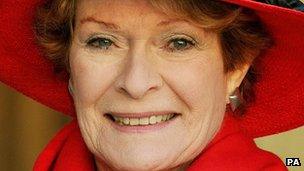
Janet Suzman was made a dame in the Queen's Birthday Honours in 2011
"I don't think it matters if it's a man or a woman. I just think running a ruddy great huge thing like that is hell on Earth. You've got to be in good health and have a mental capacity the size of the Olympic Stadium," said the Oscar-nominated actress Dame Janet Suzman.
"I think that Nick is going to be a hard act to follow. Programming and getting the right mix of plays for the National Theatre of Great Britain is a mammoth job. You have to pull in the best of everything and take risks and learn how to deal with the Olivier Theatre.
"It takes a very particular mind to want to run with public money a public institution. You have to have the right kind of energy and I'm not sure who has that. You've got to do your budgets proper. And you are now a public officer. You can't indulge your fantasies, you must indulge London's fantasies. That's a very different order of things.
"And maybe at the bottom of it you need a kind of insouciance - a kind of looseness in you which stops you from panicking all the time."
Additional reporting by Kevin Geoghegan and Neil Smith
- Published10 April 2013
- Published30 January 2013
- Published1 October 2012
- Published25 January 2012
- Published7 October 2011